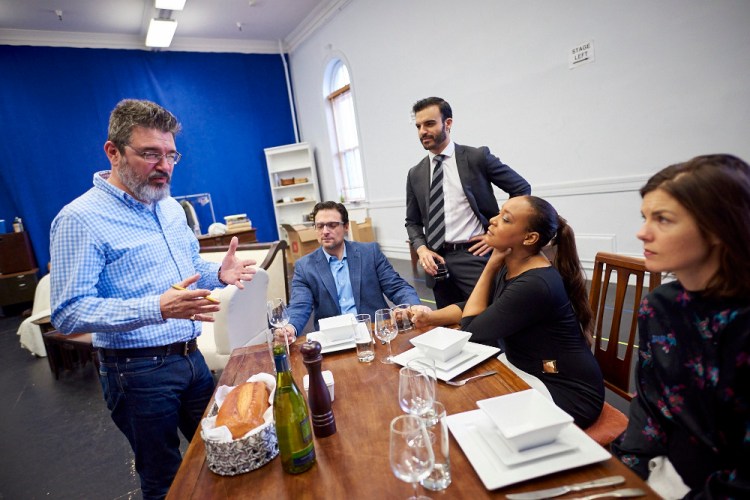The dinner table conversation in the latest play at Portland Stage Company involves an ex-Muslim, an African-American, a Jew and a WASP.
What could go wrong?
“Disgraced,” by Pakistani-American playwright Ayad Akhtar, won the 2013 Pulitzer Prize and presents themes of Islamophobia, Muslim-American identity and cultural appropriation in an explosive, taut 75-minute, one-act play. It has its final preview at 7:30 p.m. Thursday, opens Friday at Portland Stage, and continues through May 21.
It’s an uncomfortable play about cultural stereotypes, identity politics and the price of living the American dream. As part of its programming around the play, Portland Stage has scheduled community discussions and will make actors available after performances if audience members want to talk about issues raised on stage.
“This is incredibly powerful and incredibly challenging material,” said Anita Stewart, the theater’s executive and artistic director. “This is a play about how we talk to each other, so we thought it was important to schedule events that encourage conversations.”
The turbulent drama is one of the hottest plays in America today. In the 2015-16 theater season, “Disgraced” was the most-produced play in the United States, according to a survey by American Theater magazine. It tied as the second most-produced play last season and has made a star of playwright Akhtar.
“Disgraced” is set in a trophy Upper East Side apartment owned by Amir, a successful Muslim-American lawyer who denounces and masks his Muslim heritage as he rises in his firm and achieves success. His wife, Emily, is a white American artist who weaves Muslim references in her work. A dinner party with another couple devolves into a hot cauldron of acrimony when the topic turns to religion, 9/11 and Israel, with racial epithets and derogatory accusations flying across the high-rise apartment and its million-dollar view.
Cultural identity is the heart of this show. Amir doesn’t just denounce his faith, he changes his name so it sounds less Muslim and misrepresents himself to his friends and his firm. The action of the play centers around the unraveling of his secret.
In addition to after-show talk-backs with actors, the theater will host a discussion series featuring artists, arts administrators and community leaders to expand on issues raised in the play. On May 16, it hosts Color of Community, a group of college-age asylum seekers, refugees and immigrants, who will tell their own stories and offer their perspective of Portland and their world.
Director Christopher Grabowski said the conversations began when the cast first assembled in Portland to begin rehearsing.
“Many of the conversations that happen in the play happened in the rehearsal room,” he said. “It’s very tense, very stark.”
The community discussions begin Sunday, when Portland Museum of Art director Mark Bessire talks about the responsibility of artists when asking uncomfortable questions about race, class and culture. He will speak after the 2 p.m. matinee.
On Wednesday, Maine poet laureate and interim Maine College of Art president Stuart Kestenbaum leads a discussion about cultural appropriation with independent art curator Andres Verzosa and Oscar Mokeme, director of the Museum of African Culture. The talk is titled “Appropriation vs. Appreciation: Cultural Exchange in the Art World,” and begins after the 7:30 p.m. performance. Their discussion will stem from Emily’s use of her husband’s culture in her artwork.
On May 12, there’s a discussion about legal issues facing immigrants in Portland, and on May 17 the theater will explore the concept of heroism in the context of the tragic hero who falls into disgrace.
“How people process the issues and information raised in the play is important,” Stewart said. “We want to be sure that everybody feels they have a way to look at what they’ve been handed and talk about it and analyze it.”
Staff Writer Bob Keyes can be contacted at 791-6457 or at:
bkeyes@pressherald.com
Twitter: pphbkeyes
Send questions/comments to the editors.



